Deck 3: Equilibrium of Particles and Rigid Bodies: 2D, 3D
Question
Question
Question
Question
Question
Question
Question
Question
Question
Question
Question

Unlock Deck
Sign up to unlock the cards in this deck!
Unlock Deck
Unlock Deck
1/11
Play
Full screen (f)
Deck 3: Equilibrium of Particles and Rigid Bodies: 2D, 3D
1
pin at A in Problem 3.7 is removed and the pole rests on a rough surface at A in the position shown in the figure below. The minimum coefficient of friction at A required for equilibrium is: 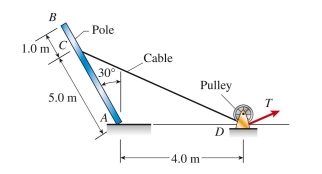
(A) 0.41
(B) 0.25
(C) 0.37
(D) 0.64

(A) 0.41
(B) 0.25
(C) 0.37
(D) 0.64
A
2
cable and frictionless pulley system at D is used to bring a 230-kg pole (ACB) to a vertical position as shown in the figure. The cable has tensile force T and is attached at C. The reaction force components,  and
and  , at A (in newtons) are:
, at A (in newtons) are: 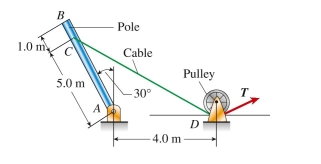
(A) 3102, 21270
(B) 21270, 3102
(C) 21342, 4214
(D) 23102, 4204
 and
and  , at A (in newtons) are:
, at A (in newtons) are: 
(A) 3102, 21270
(B) 21270, 3102
(C) 21342, 4214
(D) 23102, 4204
B
3


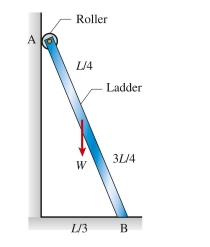 Trusses and frames
Trusses and frames(A) 0.19
(B) 0.33
(C) 0.68
(D) 0.24
D
4
reaction force at C (lb) for the beam below is: 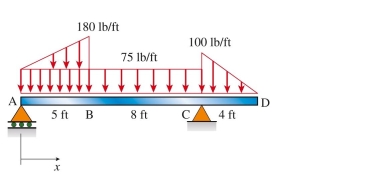
(A) 675 lb
(B) 985 lb
(C) 775 lb
(D) 525 lb

(A) 675 lb
(B) 985 lb
(C) 775 lb
(D) 525 lb

Unlock Deck
Unlock for access to all 11 flashcards in this deck.
Unlock Deck
k this deck
5
cylinders are in contact along an inclined plane. The upper cylinder (weight is 2.5W) rests against 
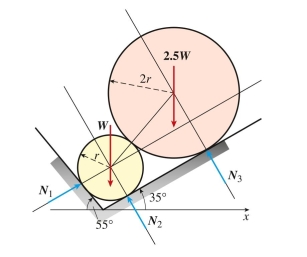
(A) 1.75W
(B) 3.5W
(C) 1.57W
(D) 2.01W


(A) 1.75W
(B) 3.5W
(C) 1.57W
(D) 2.01W

Unlock Deck
Unlock for access to all 11 flashcards in this deck.
Unlock Deck
k this deck
6


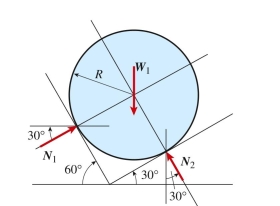
(A) 75, 130
(B) 130, 75
(C) 125, 150
(D) 75, 120

Unlock Deck
Unlock for access to all 11 flashcards in this deck.
Unlock Deck
k this deck
7
coefficient of friction between a block and the plane is 0.25 (see figure). The minimum horizontal force F (in newtons) required to cause the block to slide up the plane is: 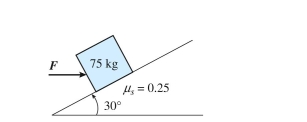
(A) 827
(B) 714
(C) 609
(D) 522

(A) 827
(B) 714
(C) 609
(D) 522

Unlock Deck
Unlock for access to all 11 flashcards in this deck.
Unlock Deck
k this deck
8
y-direction force on frame ABCDEF below acts at the center of the bar segment to which it is applied. Support B is restrained against translation in the  directions only, and support C is restrained in the
directions only, and support C is restrained in the  direc-
direc-
Tion only. Support D is a pin support. Equilibrium of the frame requires that reaction force is (in newtons):
is (in newtons): 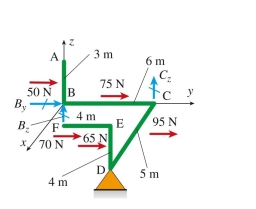
(A) 80.8 N
(B) 67.7 N
(C) 14.8 N
(D) 92.2 N
 directions only, and support C is restrained in the
directions only, and support C is restrained in the  direc-
direc-Tion only. Support D is a pin support. Equilibrium of the frame requires that reaction force
 is (in newtons):
is (in newtons): 
(A) 80.8 N
(B) 67.7 N
(C) 14.8 N
(D) 92.2 N

Unlock Deck
Unlock for access to all 11 flashcards in this deck.
Unlock Deck
k this deck
9
Force F required to hold the 75-lb weight in equilibrium is: 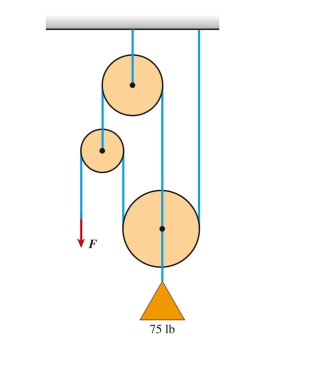
(A) 37.50 lb
(B) 18.75 lb
(C) 56.25 lb
(D) 25.0 lb

(A) 37.50 lb
(B) 18.75 lb
(C) 56.25 lb
(D) 25.0 lb

Unlock Deck
Unlock for access to all 11 flashcards in this deck.
Unlock Deck
k this deck
10
contact force F between the two cylinders in Problem 3.3 may be expressed in terms of load variable W as:
(A) 1.82W
(B) 2.5W
(C) 2.1W
(D) 1.52W
(A) 1.82W
(B) 2.5W
(C) 2.1W
(D) 1.52W

Unlock Deck
Unlock for access to all 11 flashcards in this deck.
Unlock Deck
k this deck
11
An adjustable bracket with a collar slides on a pole and is held in place by friction at A and B. The min- imum coefficient of static friction between the pole and collar so that the collar is self-locking against the pole
Under applied load F is: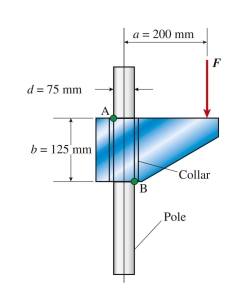
(A) 0.25
(B) 0.31
(C) 0.42
(D) 0.83
Under applied load F is:

(A) 0.25
(B) 0.31
(C) 0.42
(D) 0.83

Unlock Deck
Unlock for access to all 11 flashcards in this deck.
Unlock Deck
k this deck


